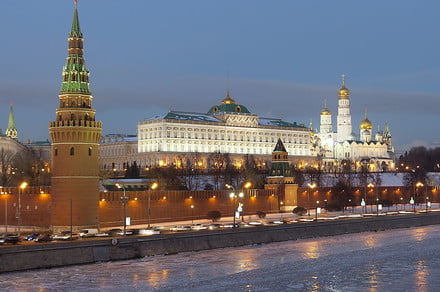The Kremlin Wikimedia Commons
A new Russian law which makes it possible for the government to sever the country’s internet connections to the outside world has the support of less than a quarter of the population, but it’s coming into force anyway. The new “Runet” law is packaged as important for national security, but detractors are concerned that it could see the authorities cut off its citizens’ access to internet sites and services outside of Russia entirely.
The Runet law was introduced in December 2018, and as ZDnet highlights, its popularity was abysmal, with just 23 percent of Russians polled by Kommersant supporting it. Regardless of the cries of censorship and concerns of overbearing government oversight in the online sphere, Russian president Vladimir Putin signed it into law on May 1, initiating a process that would see it implemented by November this year. All telecoms providers in Russia are obliged to abide by its provisions by the start of 2021.
The legislation will see Russia build its own domain name system (DNS), and forces telecoms providers to install new equipment which would allow the country’s communications and media censorship body, the Roskomnadzor, to direct all internet traffic through Russian exchanges only. That would effectively make accessing international web sites and services far more difficult for those living within Russia. A test of such a cut-off was planned for earlier this year.
The law was painted as being an important security measure which would allow Russian internet to continue to function in the event that other countries cut off internet access. However, detractors have pointed out that making such a functional internet platform within Russia would also make it possible to completely control what was seen and heard online in the country. Such a centralized approach to internet management would give Roskomnadzor sweeping censorship authority. Indeed, as the TASS news agency highlights, this law effectively gives it the ability to bypass ISPs altogether, blocking content unilaterally and arbitrarily.
This could make it difficult for foreign-based encrypted communication services such as Telegram (all of which are banned in Russia) to continue to operate. VPNs may also be much harder to operate and use under such a law.
Following protests in March against the Runet law, the Kremlin insisted that it was merely a precaution against a potential external threat to its own internet infrastructure.

